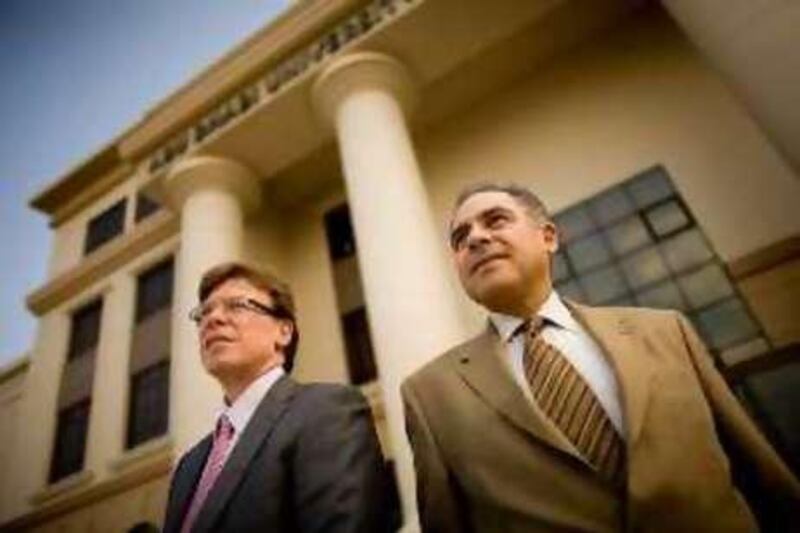ABU DHABI // The fastest-growing private university in the UAE has officially opened its new campus in the capital and has announced plans to double its intake of students. Sheikh Nahyan bin Mubarak, Minister of Higher Education and Scientific Research, opened Abu Dhabi University's Dh600 million campus in Khalifa City yesterday.
The four-storey main building includes 100 classrooms, 26 science laboratories and a library. There are separate dormitories for male and female students, villas and flats for academic and administrative staff, a shopping area and a mosque. ADU opened in 2003 and now has about 3,800 students, more than 40 per cent of whom are Emirati, at its Khalifa City and Al Ain campuses. The university's president and founder is Sheikh Hamdan bin Zayed, the Deputy Prime Minister.
The university began using its Khalifa City campus in 2006, although construction has continued since then and is set to carry on beyond yesterday's inauguration. "The aim is to double enrolment in five years," said Dr Nabil Ibrahim, the ADU chancellor. He said 1,150 students joined this autumn alone. ADU specialises in engineering, science and business courses, although Dr Ibrahim said the university was looking to expand into the humanities and social sciences to offer a "well-rounded and comprehensive education".
He said ADU had a huge advantage over branch campuses of overseas universities because it was "committed to the future of the UAE". "We are a university that will be here for a long time. We're deeply rooted in this country and we feel the future of education in the UAE is so important that we need a national university to lead this mandate." He said the university wanted to expand outside Abu Dhabi and open more branches in the UAE: "We do have a campus in Al Ain but the success is encouraging us to look at other possible locations."
Fees, at about Dh30,000 to Dh35,000 (US$8,167 to US$9,528) a year for a full-time undergraduate, are between 50 per cent and 33 per cent lower than those charged by some UAE branch campuses of overseas universities. But Prof James Stuart Pounder, the associate provost for academic affairs, insisted that low fees were not the only reason the university was growing. He noted that Emirati students, for example, had to pay to attend ADU when they could study for free at a federal university.
"Forty-eight per cent of our students are UAE nationals. That's a significant amount of people who choose to come here," he said. Dr Ibrahim said that while tuition fees were the university's main source of income, it was keen not to raise them. Fees did not rise this year. "We are sensitive to social responsibility. We don't want to increase tuition beyond the capability of the average person here," he said. "Access is very important to us. We want to maintain access while running this as a business."
Some students from poorer families attend the university thanks to a programme that helps with tuition fees. Nearly all courses are taught in English, and men and women are taught separately as undergraduates but graduate programmes are mixed. Dr Ibrahim said much of the growth in enrolments would come through the expansion of postgraduate programmes. About 650 students at the university are taking master's degrees but ADU is looking to introduce doctorate programmes, and he said research would focus on the UAE's strategic goals.
"Some of the areas we're interested in include such things as solar and renewable energy, to make it more affordable, and desalination," he said. "We're also looking at high technology in IT, communications and robotics. These are very important areas. What's most important is to look at the intersection between scientific and technological research, and linking it to business and entrepreneurship."
The university hopes to increase its external grant funding for research to between Dh10m and Dh15m. ADU is licensed by the Ministry of Higher Education and Scientific Research and programmes have to go through the accreditation system of the ministry's Commission for Academic Accreditation. The university is not internationally accredited, although Dr Ibrahim said it had applied for accreditation from the Western Association of Schools and Colleges in the US.
dbardsley@thenational.ae







